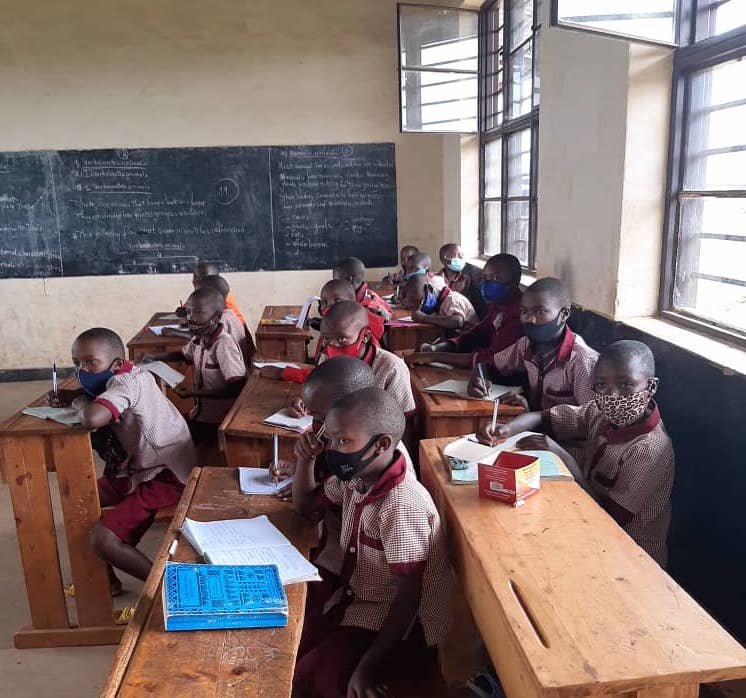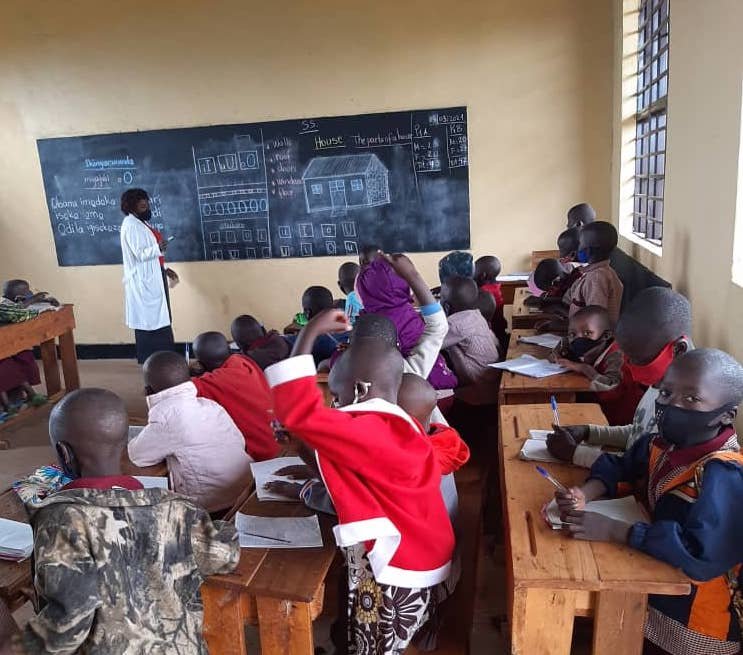By Katy Allen-Mtui | Director
Very Warm Greetings,
I hope this letter finds you well and in good spirits.
I never would have thought that a year down the line we would still be so affected by the pandemic.
Rwanda is the most densely populated country in Africa with a population of roughly 13.2 million and a land mass about the size of Wales. The government has exercised tight control of the Covid crisis, and to date 265 people are known to have died of the disease. However, as in other countries, the school pupils have missed months and months of their education.
Schools opened across the country on Wednesday 24th February. For those in Primary 1, 2 and 3, they were last in school in March 2020. In the rural areas many had no access to television to watch lessons broadcast by the government, but some, but by no means all, had access to a radio to listen to lessons broadcast on radio.
Our popular radio programmes, ‘English with Teacher Katy’, were aired again during December. The programmes for P2 and P3 were broadcast twice a week on Radio Rwanda. We got very good feedback from the radio station,
“People are very interested in the lessons. The lessons are very well done with super methodology, and we got a call asking if we can run at least a daily programme.”
Again, the pupils who are part of our project benefited greatly from the radio progammes. They know my voice and that alone provided some excitement, but more important was the much needed revision. Going over sentence structures that they had already learned and hearing them in familiar contexts, with time given for them to repeat the sentences and answer questions, gave a great boost to their confidence.
On return to school every pupil has a temperature check at the school gate each day. Both teachers and pupils are wearing masks, following government advice. That may hinder learning, as a lot depends in language learning on watching the teacher’s facial expressions and the movement of the mouth.
The teachers have a huge task after a year of school closure, but using our NOEC books will help them enormously. The beauty of the NOEC books is that learning is based on the build-up of sentence patterns and structures, and so each sentence pattern is constantly revised and re-used as new ones are introduced. The teaching is based on classroom contexts, and also with very clear pictures in the Pupil’s Books which aid understanding. This means that the teachers can easily go back to earlier parts of the book and quickly revise until they are comfortable that most of the pupils are ready to pick up where they left off nearly a year ago.
In the government textbooks, the teaching of English is based on topics such as Greetings, Health, Traditional Tools etc. Each topic is riddled with different sentence patterns, and many of those are never met again once that topic is ‘done’ and the pupils move on to new topics. I have written to government education officials many times about this approach.
I mentioned in my last report that the return to school this year has seen the introduction of the government’s new policy that all subjects and lessons are to be taught in English from Primary 1. In previous years, from 2011, Primary 1 to Primary 3 had all their lessons taught in the mother-tongue of Kinyarwanda with English taught as a foreign language for seven periods a week, and in Primary 4 the medium of education changed to English. The teaching now using English for all subjects from Primary 1 will be a challenge as many teachers of Primary 1 to Primary 3, especially in rural primary schools, do not have sufficient command of English in order to be able to teach in it.
Dr Timothy Williams (Adjunct Professor in Global Social Work at Boston College and Researcher for Effective States and Inclusive Development) has overseen the evaluation of our work in Rwanda, and his latest article about the change of language in Rwandan schools for World Politics Review is excellent and most interesting. He has given me permission to share his work. ‘Research suggests that children learn best if they spend the first few years of their schooling grasping foundational and complex concepts using the language that is also spoken in their homes. The opposite also holds true: Forcing pupils and teachers to use an unfamiliar language without adequate preparation or support jeopardizes learning, particulary those in poorer rural areas where exposure to the English language is limited. The government’s most recent decision appears to reject this evidence – the same evidence it had previously embraced – potentially disadvantaging hundreds of thousands of students during the foundational years of their education.’ The whole article is well worth reading and can be found using this link:
In this new context, the use of our NOEC books could provide real help. Teacher Vestine at Gasabo primary school teaches social science, which she now has to teach in English when she was used to teaching it in the mother tongue of Kinyarwanda. Vestine has always been an enthusiastic participant in our weekly teacher development sessions held in the lunch break which use the NOEC books to improve the teachers’ English. Vestine now uses the NOEC Teacher’s Books to familiarize herself with the language and particularly how to ask questions and how to help her pupils to answer her questions. So, already the NOEC books have proved their worth to Vestine now that she has to use English as the medium of instruction for social science. The books could benefit so many others.
If the NOEC books were used as part of teaching training then teachers would gain a very thorough grasp of the language and its sentence structures and patterns, and also be guided in good teaching methodology which can transfer to the teaching of any subject. Of course, the continued use of the NOEC books by teachers who teach English as a subject has already proved to be successful.
After Emmy Nyirigira, the Chair of our trustees in Rwanda (where we operate as Support to Primary Education Rwanda – SPER), met the Minister of State for Primary and Secondary Education, Mr Gaspard Twagirayezu, in November my colleagues Damian and Ivan had a meeting with the Minister in December. In attendance were the Minister’s adviser, and a representative from the Rwanda Education Board (REB). The meeting was summarized by the adviser in an email circulated to all who were present:
‘Dear all,
On behalf of Hon. Minister of State in charge of Primary and Secondary Education, I am pleased to share the following key action points of the meeting for your consideration and action:
The meeting was concluded by reemphasizing that SPER’s support like any other partners in Education is necessary towards how things can be improved in CBC (compentence based curriculum) as a learning method.
Regards,’
Since then, there began major restructuring within REB, and the schools remained closed. We are now chasing for progress.
The good news is that the primary schools are now open and education can get back on track, and our teachers and pupils are well supported by the NOEC books and by the regular visits of Damian and Ivan. A recent visit to Claude’s Primary 4 class at Gasabo Primary School is in the photograph below with everyone nearly unrecognizable in their masks!
This has been a difficult year for everyone, but I am grateful beyond words for the donations that have continued to come in to enable our work to keep going. Thank you so very much indeed for your extremely generous support.
With very best wishes,
Katy Allen Mtui
Project reports on GlobalGiving are posted directly to globalgiving.org by Project Leaders as they are completed, generally every 3-4 months. To protect the integrity of these documents, GlobalGiving does not alter them; therefore you may find some language or formatting issues.
If you donate to this project or have donated to this project, you can receive an email when this project posts a report. You can also subscribe for reports without donating.
Support this important cause by creating a personalized fundraising page.
Start a Fundraiser
